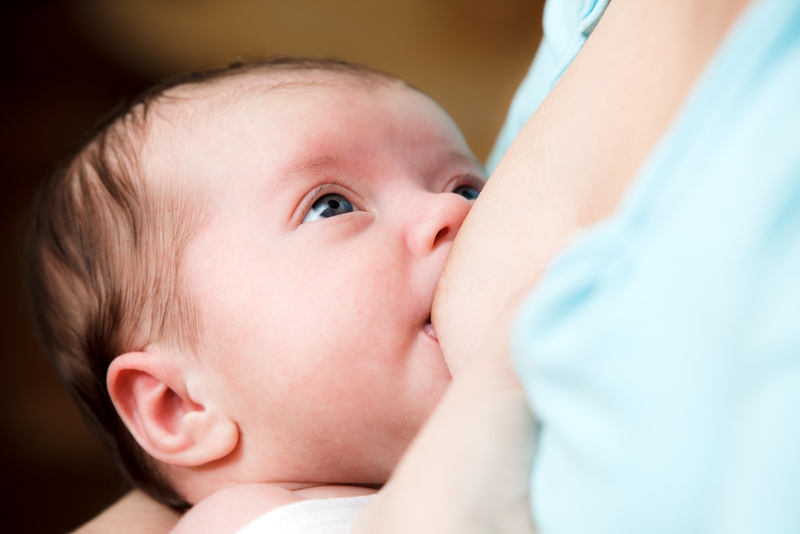Golden milk, liquid gold, Mama milk – whatever you want to call it, one thing is for sure: breast milk is and will always be best for babies. It provides many nutrition and minerals, and it is a wonderful opportunity that allows you to bond with your baby. However, does your child start to fuss or even cry during feeding? If yes, you start to wonder whether your baby is allergic to breast milk. If he is, what can you do about it? Keep reading to find out what to do when baby allergic to breastmilk.

Can Your Baby Be Allergic to Your Breast Milk?
Milk Protein
Among the most common culprits why your baby developed sensitivity to breastfeeding is because of the cow’s milk protein you ingested. In fact, the American Academy of Pediatrics reported that 2 to 3 babies out of every 100 exclusively breastfed babies demonstrated an allergic reaction to breast milk. This is due to the cow’s milk included in your diet.
How will you know if your baby is sensitive to cow’s milk protein? Pay attention to the following symptoms after feeding such as:
Bright green or slightly bloody stool
Fussiness or severe colic
Rash
Vomiting and/or difficulty breathing
Hives
Severe diarrhea
In case your child showed any of the symptoms, call your pediatrician immediately to determine the treatment. This includes eliminating any product with cow’s milk such as milk, ice cream, cheese, or salad dressings with whey protein or casein. This will help your baby recuperate for a few weeks before slowly re-introducing dairy foods back to your diet. Inform your pediatrician in case there are no signs of improvement to help you determine the next steps.
Lactose
Some people mistake baby allergic to breastmilk as lactose intolerance. Apparently, lactose intolerance and breast milk allergy are two different concepts. When a child is lactose intolerant, this means your child has no immune response against various offending substance as opposed to breast milk allergy wherein the sugar lactose can make its way into the breast milk. Consequently, your baby is unable to digest the milk properly due to limited production of lactase. In rare cases, there is an inherited form of lactose intolerance that requires you to add lactase on your expressed breast milk to make it easier for your baby to consume.
Don’t worry. You can still breastfeed and eat dairy products even if your baby is lactose intolerant.
Galactosemia
It could be galactosemia, which is not true allergy. Nonetheless, this is a “disorder” that are related with lactose.
It is where your baby’s liver is not able to break down galactose, a type of milk sugar found in lactose’s components. If your baby has galactosemia, he may experience the following symptoms:
Diarrhea
Vomiting
Jaundice within days after birth
Failure to thrive
In this condition, drink only milk that is galactose-free to keep him/her full.
Food Sensitivity
Feel like your baby allergic to breastmilk? He/she may just have food sensitivity. They say what you eat is important, especially if you are breastfeeding. Apparently, there are certain foods that could cause reaction to your child.
For instance, spicy or gassy foods such as cruciferous vegetables could cause a baby to fuss, cry, or nurse more often. The good news is that unlike allergies, food sensitivity has less serious symptoms wherein your child will not have rashes or experience abnormal breathing. At the same time, it won’t last more than 24 hours; otherwise, it may indicate colic or other problems.
Therefore, pay attention to what you eat. If you notice that your child reacts negatively after you eat certain foods, then avoid them temporarily. In case you avoided these food triggers, but food sensitivity still happens, consult your pediatrician to help you determine the right cause of action.
Oversupply of Milk
In case your child did not show symptoms of any of the four causes mentioned above, then consider milk oversupply.
Milk oversupply is the mother’s forceful feeding of milk and usually happens within the first few weeks to months of breastfeeding. Don’t feel bad. This only happens because of the excessive spraying or leaking that you noticed in your baby, causing you to supply more milk to your child. Unfortunately, your baby is unable to keep up with the supply of milk; thus causing discomfort but not baby allergic to breastmilk.
How will you know if you are feeding your child too much? Watch out for the following signs and symptoms:
Gassiness or fussiness
Refusing to nurse
Spitting the milk more often
Choking
Pulling off the breasts more often
More frequent stools that are usually frothy, green, and contain mucus
Don’t worry. You can prevent this milk oversupply by burping him; thus providing some comfort for your baby. Consider nursing more often to reduce your supply of milk in between sessions if you worry he/she doesn't get enough. Your nursing position is also crucial in preventing milk over-supply, so make sure to pay attention.
Final Thought
Breastfeeding can be gruesome process in the beginning. However, it will get easy and more manageable few months after. Despite the challenges, be assured that a woman’s breast milk is a crucial component in your child’s development.
View All Comments /Add Comment